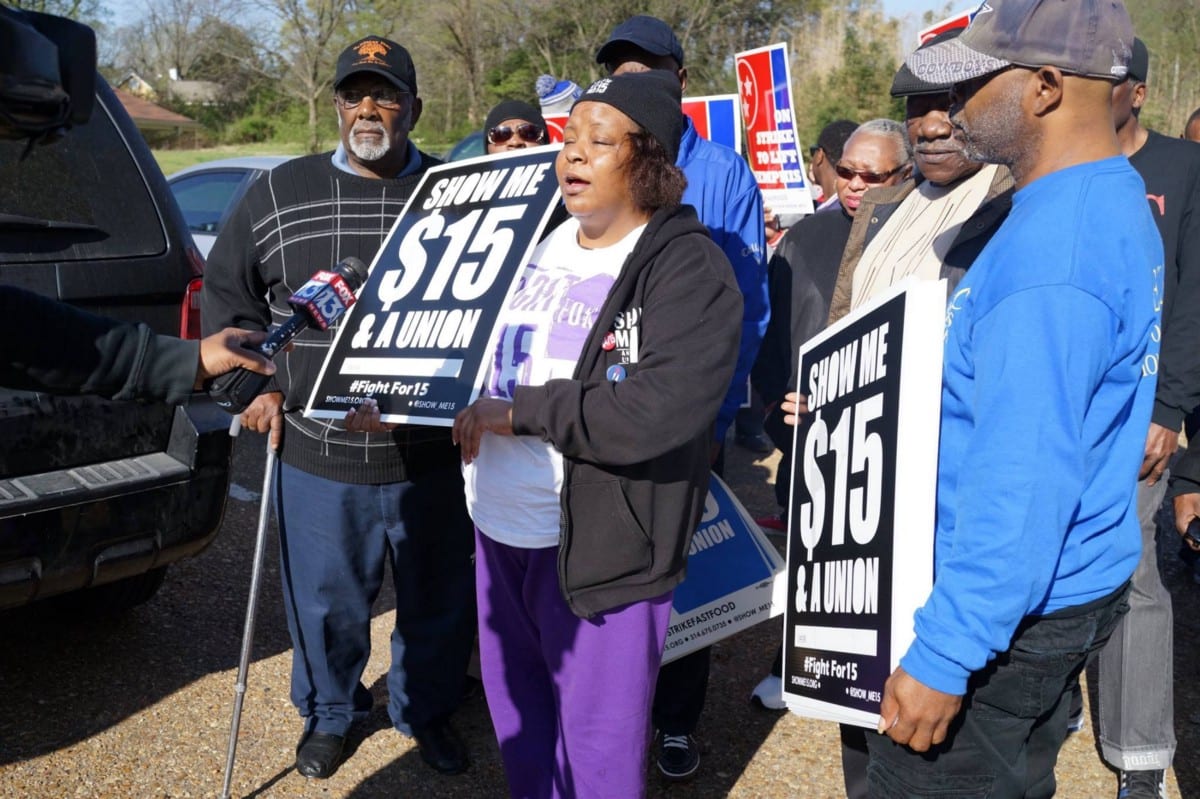
Struggle to survive on poverty wages builds solidarity among workers
May Day, May Day! Immigrant workers and low-wage workers unite
by Micaela Watts | April 28, 2017 11:05 am
For 27 years, Dunetra Merritt has worked for fast food restaurants in Memphis. She started when she was 15 years old, making minimum wage.
Today, she still makes minimum wage — $7.25 an hour at Checkers.
“My nieces, nephews, cousins, most of my friends… We all work in fast food restaurants. We’re all making the same wages, and we have no way to help one another out,” said Merritt, who is involved with the Fight for $15 movement. “It’s unbelievably hard just to take care of rent.”
Until recently, Merritt shared an apartment with her adult daughter. But since her daughter moved out, she isn’t sure how she will come up with $375 each month by herself. That’s just one example of how precarious her day-to-day survival is, and how it can unravel simply by losing a roommate.
If Merritt isn’t working, she plans to attend one of the local May Day protests to draw attention to two seemingly separate but undeniably linked factions of workers: Undocumented immigrant workers and workers in low-paying service industries such as fast food and home health care.
The commonality both groups share — the struggle to survive on poverty wages — fuels the increasing crossover support between advocacy groups on a national and local level.
The first May Day, observed on May 1, was in 1886, when 300,000 workers across the country walked off their jobs to demand an eight-hour workday and more broadly, an end to employers’ exploitation of the working class.
Today, May Day is also a national “Day Without Immigrants” (“Un Dia Sin Inmigrantes) boycott. To draw attention to the economic contributions of immigrants, immigrants and allies are asked, if possible, to refrain from going to work or school or making any purchases. The movement is spearheaded nationally by The Cosecha Movement, Fight For $15, Food Chain Workers Alliance, FIRM (Fair Immigration Reform Movement) and UNITE HERE Tech Cafeteria Workers.
Locally, Memphis’ participation in the boycott expands even further, with 12 groups lending support, including Memphis Voices for Palestine, Cosecha Memphis, and Memphis Intercultural Coalition.
There are two main events: A Memphis May Day rally at 3 p.m. Sunday at Health Sciences Park; and a march and rally starting at 5 p.m. Monday. The march begins at Clayborn Temple and ends at the National Civil Rights Museum.
Latino Memphis spokesperson Fabiola Cervantes, said the organization feels confident that the protest will draw more participants than a protest in February, held days after President Donald Trump signed an executive order restricting travel from seven majority Muslim countries. (Federal judges ruled against Trump’s original travel ban and a revised order.)
On Feb. 1, more than 2,000 people marched from Clayborn Temple to the National Civil Rights Museum, some carrying signs that read “And Jesus said… ‘Sorry, just got banned’” and “The power of the people is stronger than the people in power.”
At the museum, dozens of members of the Muslim community knelt for evening prayers. Afterward, Latino immigrants, a Jewish rabbi, refugees from Somalia and representatives from Black Lives Matter all spoke.
For this protest, explained Cervantes, “There’s been more time to prepare… and with 12 local organizations lending a hand to getting the word out through social media, we feel that participation will be stronger.”
The variety of participating organizations will boost awareness of the fact that immigrants are not exclusively from Spanish-speaking countries, he said.
For Merritt, who has four adult children, her worries include her utility bill. It’s more than her rent and her lights could be cut off as early as next week.
Two months ago, she had a heart attack, which she suspects was stress related. She can’t afford her heart medicine or health insurance.
The last federal minimum wage increase was in 2009, Merritt pointed out. “It’s 2017. Come on, now,” she said.
“I’m on the frontlines of this fight and I’m gonna stay fighting for my nieces, for my grandkids. I think they still have a chance, but we have to get a living wage.”
To search for a May Day event near you, go to Rise Up’s event page here.
This article first appeared on MLK50: Justice Through Journalism.
